Episodes
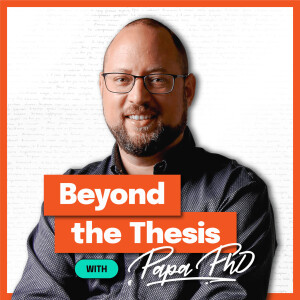
Thursday Sep 05, 2024
Thursday Sep 05, 2024
Join the Papa PhD Skool community !
Welcome back to another insightful episode of "Beyond the Thesis With Papa PhD"! In today's episode, David Mendes sits down with this week's guest, Paulina Cossette, to explore her fascinating journey from academia to a thriving career in editing. Paulina, a former political science professor and author, shares her transition story, highlighting the importance of reframing skills and battling impostor syndrome. Together, they delve into the value of experience outside academia, the challenges of reinventing oneself, and the fulfillment found in new career paths.Whether you're considering a move from the tenure track or seeking balance outside academic confines, this episode is packed with practical advice and inspiration. Join us as we unpack the process of shedding academic identities and embracing new, rewarding opportunities.
After spending 12 years in academia as a graduate student and political science professor, and struggling to find joy and work-life balance while working 7 days a week, Paulina finally found the courage to leave the academy in 2019.Since becoming a copy editor, she has built a six-figure business that allows her to live and work wherever and whenever she wants, take real vacations without any guilt, and collaborate with kind, brilliant clients all over the world. Paulina is now sharing what she's learned with scholars who need a change, so they can find joy and true time freedom, too.
What we covered in the interview:
Reframe and Reskill: Transitioning from an academic career to editing involves reframing your academic skills to appeal to editing agencies. Highlight your precision, timely work, and ability to improve language.Explore Opportunities Beyond Traditional Paths: Many tenured faculty and full professors are moving into editing due to burnout and dissatisfaction with academia. Recognize the variety of career options available to you and the possibility of finding fulfillment in less traditional roles.Join Supportive Communities: Navigating career changes can be challenging, but you're not alone. Engage in communities that offer support through shared experiences and practical advice.🔗See the resources section below for links!
This episode’s resources:
Website | AcadiaEditing.com"What is Academic Editing and is it Right for Me?" | AcadiaEditing.com/becomeaneditorFacebook | AcadiaEditingServices
Leave a review on Podchaser !
Thank you, Paulina Cossette!
If you enjoyed this conversation with Paulina, let her know by clicking the link below and leaving her a message on Linkedin:Send Paulina Cossette a thank you message on Linkedin!Click here to share your key take-away from this interview with David!
You might also like the following episodes:
Priten Shah – Opportunities and Caveats of Generative AIAnca Bodzer –From PhD to Project ManagementAmani Said – How to Make impact with Your CareerStephani Mason – Promoting Diversity in Faculty
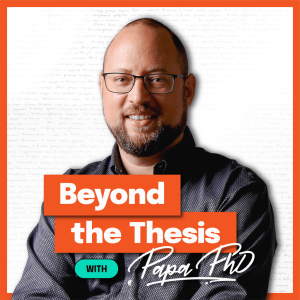
Thursday Aug 29, 2024
Thursday Aug 29, 2024
Join the Papa PhD Skool community !
Welcome to this new episode of "Beyond the Thesis With Papa PhD" where we delve into the transformative shifts in academia and beyond. In today's episode, "Generative AI: Opportunities and Caveats in Academia," David Mendes sits down with Priten Shah, an expert in the application of generative AI in education technology. In their conversation, David and Priten explore the rapid evolution of generative AI, from its early implementations in projects like Sanskrit language processing to the watershed moment of Chat GPT's release in November 2022.They unpack the profound implications of AI in education—highlighting both its immense potential for personalized learning and mastery education, and the ethical concerns it brings, such as plagiarism and over-reliance on AI-generated data, and Priten shares insights into specific AI tools like Perplexity and Elicit for academic research, elaborating on practical applications of AI in creating tailored educational experiences.As we navigate through the benefits and challenges posed by AI, we also examine the crucial need for educators to receive proper training and support to integrate these technologies effectively. So, tune in as we explore how generative AI is revolutionizing the academic landscape while weighing its caveats with careful consideration. Plus, don't miss Priten's thoughts on maintaining authenticity in AI-assisted work and the future of education technology.Enjoy the episode!
PRITEN SHAH is CEO of Pedagogy.Cloud, which provides innovative technology solutions to help educators navigate global challenges in a rapidly evolving world. He is the author of Wileys Jossey-Bass publication, AI & The Future of Education: Teaching in the Age of Artificial Intelligence.Priten is also the founder of the civic-focused nonprofit United 4 Social Change. He has a B.A. in philosophy and an M.Ed. in education policy from Harvard University.
What we covered in the interview:
Revolutionizing Education with AI: Priten Shah discusses the promising applications of generative AI for mastery learning and standards-based learning, highlighting how AI can create personalized practice exercises tailored to students' unique needs and interests.Balancing Benefits and Risks: While AI holds great potential, Priten emphasizes the importance of skepticism and ethical considerations. He warns against over-reliance on AI-generated data for research without proper cross-verification and highlights the need for clear guidance on ethical usage.Empowering Educators and Students: Through tools like socret.ai and various AI research aids like Perplexity and Elicit, AI can significantly support the writing and production processes in higher education, enhancing clarity and efficiency while maintaining human oversight.🔗See the resources section below for links!
This episode’s resources:
Facebook: Pedagogy CloudWebsite: Pedagogy.cloudWebsite: Pedagog.aiWebsite:NotebookLM.GoogleWebsite: Perplexity.aiWebsite: Elicit.com
Leave a review on Podchaser !
Thank you, Priten Shah!
If you enjoyed this conversation with Priten, let him know by clicking the link below and leaving him a message on Linkedin:Send Priten Shah a thank you message on Linkedin!Click here to share your key take-away from this interview with David!
You might also like the following episodes:
Lexa Graham – Using Humor in ScienceAnca Bodzer –From PhD to Project ManagementAmani Said – How to Make impact with Your CareerStephani Mason – Promoting Diversity in Faculty
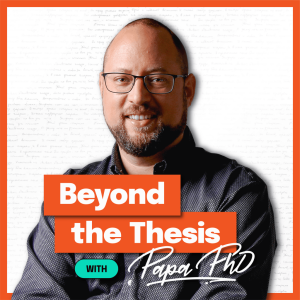
Thursday Aug 22, 2024
Thursday Aug 22, 2024
Join the Papa PhD Skool community !
Welcome to Season 6 of "Beyond the Thesis With Papa PhD", the podcast where we dive deep into the journeys of individuals who have transitioned from academic pursuits to thriving careers in various industries. Today, we have a riveting episode featuring Anca Bodzer, a seasoned program manager specializing in the life sciences vertical. During the interview, Anca shares her insightful journey, transitioning from academia to the localization industry, and the valuable lessons she's learned along the way.In this episode, host David Mendes and Anca delve into the vital importance of authenticity and being genuine in professional interactions and interviews. Anca emphasizes how authenticity is not just a buzzword but a quality highly valued by employers. They explore the significant considerations one should make before pursuing further education or certifications, ensuring it aligns with career goals and personal values.Anca offers a detailed blueprint of her experiences as a project manager and now a program manager, shedding light on the distinctions between these roles and the transferable skills from her PhD that have been invaluable in her career. Together, David and Anca discuss the necessity of learning the language of the new industry when transitioning from academia, and the powerful impact of networking and enduring relationships.Anca's story is one of perseverance, authenticity, and the courageous decision to follow one's inner voice and core values. Whether you're contemplating a similar career move or simply curious about the crossover between academia and industry, this episode is packed with wisdom and actionable advice.Join us as we traverse the path from PhD to program management with Anca Bodzer, and uncover the strategies to translate academic experience into industry success!
Anca Bodzer was born and raised in Romania but she moved to Madrid, Spain in 2008 to pursue an MA in Intercultural Communication, Translation and Interpreting. Afterwards, she was awarded a PhD scholarhisp, so 15 years later, she is still living in SpainAnca Bodzer is the holder of a PhD in Translation and Interpreting and she currently works as a Program Manager specialized in the Life Sciences vertical, more precisly in Linguistic Validation of Clinical Outcome Assessments.Anca has strategically pivoted from academia into the localization industry and she has also started her own podcast Languages Surfers as a platform to bridge the gap between professionals from the localization industry and academia.
What we covered in the interview:
Embracing Authenticity in Your Professional Journey: Authenticity and being your true self are highly valued by employers. Genuine interactions can pave the way for meaningful professional connections and opportunities.Leveraging Transferable Skills: Skills honed during ayour PhD, such as communication, problem-solving, and independence, are highly valuable in the corporate world. Understanding how to articulate these skills in industry language is crucial for a successful transition.The Key Role of Networking: Building and maintaining authentic relationships is vital to your professional development. Networking isn't just about making connections—it's about creating lasting, genuine relationships that can provide support, mentorship, and opportunities.🔗See the resources section below for links!
This episode’s resources:
Podcast: Language Surfers WebsitePodcast: Language Surfers Spotify
Leave a review on Podchaser !
Thank you, Anca Bodzer!
If you enjoyed this conversation with Anca, let her know by clicking the link below and leaving her a message on Linkedin:Send Anca Bodzer a thank you message on Linkedin!Click here to share your key take-away from this interview with David!
You might also like the following episodes:
Lexa Graham – Using Humor in ScienceAndy Churchill –Pre...
![Pivoting From Academia to the Private Sector With Terence Milstead [Rerun]](https://pbcdn1.podbean.com/imglogo/ep-logo/pbblog20665444/580491cbb2b5608b4e902ece0176f14a_300x300.png)
Thursday Aug 15, 2024
Thursday Aug 15, 2024
In this last stretch of season 5 of Beyond the Thesis with Papa PhD, I am bringing you another treasure from the Papa PhD vault - my great conversation with Terence Milstead, during which he laid out his complete blueprint for a successful career transition from academia into the private sector.Throughout the episode, Terence shares the strategies he used himself, along with the story of his experience pivoting out of his academic career, so be sure to have pen and paper if you are in the process of planning your own transition!
Terence Milstead received his Ph.D. in Urban and Regional Planning in 2008 from Florida State University where his research was focused on factors that influence people to invest time, money and emotional energy into upgrading their dwellings, even in unstable housing markets. This question led him to the former Soviet Union on a Fulbright and subsequently to other parts of the globe. But it also ignited a deep interest in qualitative research and the power of deeply listening to others.After completing his Ph.D. Terence started down the academic career path. However, after a few years he realized that a full-time career in academia was not what he had envisioned. So, in 20014, he transitioned to private sector, research-based consulting, relocating to the East Coat. But the path from academic to private-sector consultant was a crooked one and didn't happen overnight. In this episode Terence shares how he came up with a transition plan that ultimately led him to his current position as Head of Qualitative Insights at a global strategic consulting firm based in Washington D.C.
Thank you, Terence Milstead !
If you enjoyed this conversation with Terence, let him know by clicking the link below and leaving him a message on LinkedIn:Send Terence Milstead a thank you message on LinkedIn!Click here to share your key take-away from this interview with David!
This episode’s resources:
Terence Milstead | FacebookTerence Milstead | LinkedinTerence Milstead | Website
You might also like the following episodes:
Martha Boeglin – Unlocking Your Thesis Writing Super PowersAlbertha Joseph-Alexander – Using Scicomm to Make a DifferenceDavid Giltner – Reconciling the Research and Development MindsetsNatalia Bielczyk – Figuring Out Where You Fit in the Job Market as a PhDAs always, if you find value in Papa PhD and in the content I bring you every week, click on one of the buttons below and send some of that value back to me by becoming a supporter on Patreon or by buying me a coffee :) Now with the added perk of receiving the brand new Papa PhD and PhD Dojo stickers!
Support the show on Patreon !
Or buy me a coffee :)
Get the Papa PhD Career Readiness Tool kit !
![Psychologie doctorat et transdisciplinarité avec Pierre-Henri Garnier [Rediffusion]](https://pbcdn1.podbean.com/imglogo/ep-logo/pbblog20665444/5597a0a8de7b1aab884e1dbcee45795c_300x300.png)
Thursday Aug 08, 2024
Thursday Aug 08, 2024
Salut! Cette semaine sur Papa PhD, je t'apporte un des épisodes les plus écoutés de la saison 3 au long duquel, avec mon invité, Pierre-Henri Garnier, on a parlé psychologie, transdisciplinarité et doctorat, et à la fin de laquelle il a partagé un exercice de réalité virtuelle (sans casque) qui t'aidera à maîtriser ton stress. Bonne écoute!
Ce que tu apprendras dans cet épisode :
Un exercice d'autohypnose pour t'aider lorsque tu éprouves de l'anxiété ou du stressL'intérêt du doctorat en tant que psychologueL'ambivalence qu'on peut ressentir vers la fin de la thèseL'importance de se sentir soutenu par ses pairs et par son directeur de thèseCe qu'est la cyberpsychologieCe qu'est que l'approche transnumériste en psychologieCe que le passage au doctorat apporte à Pierre-Henri dans son activité libéraleComment les Doctoriales ont ouvert les horizons de Pierre-Henri à l'interdisciplinarité et à la transdisciplinaritéTu aimes Papa PhD ? Laisse-moi un commentaire ici - une courte phrase suffit ! Et inclus ton identifiant Twitter – comme ça je pourrai te remercier personnellement !
Pierre-Henri Garnier est psychologue en libéral au centre interdisciplinaire de thérapie intégrative à Rezé près de Nantes. Il développe notamment une pratique en cyber thérapie utilisant l'hypnose associée à la réalité virtuelle. Il est également docteur en Sciences de l'information et communication. Grace à l'obtention d'une bourse ministérielle, Il a effectué son doctorat sous la direction du professeur Jean-Pierre Courtial, au sein de la maison des Sciences de l'homme à Nantes.Après son doctorat, Pierre-Henri a notamment exercé une dizaine d'années en tant que psychologue au chu de Nantes, en diabétologie pédiatrique puis en soin de support et soin palliatifs.Aujourd'hui il exerce en libéral et ses compétences de docteur structure sa pratique. Elles lui permettent d'être chercheur associé au sein du centre fédératif douleur soin de support et soin palliatifs du chu de Nantes.En lien avec sa pratique de clinicien, il est également enseignant et formateur dans le domaine de la communication et éducation thérapeutique, en hypnose thérapeutique. Il développe notamment avec son ancien directeur de thèse une approche dite transnumériste dans le champ des psychothérapies et nouvelles technologies, la réalité virtuelle plus particulièrement.Un docteur psychologue clinicien transdisciplinaire, transnumériste et passionné de la transe créative et hypnotique.
Merci Pierre-Henri !
Si cet entretien avec Pierre-Henri Garnier t'a plu, fais-lui en part en cliquant sur le lien ci-dessous et en lui laissant un message sur LinkedIn :Clique ici pour le remercier sur LinkedIn !Clique ici pour partager avec David le principal message que tu retiens de cet épisode !
Les perles de sagesse de Pierre-Henri :
« De mon point de vue de psychologue, il y a tout un travail à faire auprès des étudiants de repérage de ce qui sonne juste pour eux, mais au niveau corporel – pas dans la tête. Sauf que parfois, en tant que doctorant, on est un peu dissocié, on dirait en hypnose. On est plus dans la tête que dans le corps, donc ça peut être vire piégeant d'écouter davantage sa pensée et son intellect que son corps. Et donc, je rejois tout à fait ton message de prévention – chers auditeurs, écoutez votre intuition, ce que vous ressentez et généralement, ça vous guide, en fait. »« Le stress est utile, donc il faut plutôt le filtrer et dialoguer avec lui, et trouver la juste distance entre ce qui est négatif de ce stress-là. On exorcise le côté négatif et on endorcise le côté ressource, sécurisant, positif. Mais l'astuce, c'est vraiment d'être dans le corps, dans la sensation, dans l'exception du corps qui ressent la sécurité. »
Les ressources de cet épisode :
Pierre-Henri Garnier | LinkedInPierre-Henri-Garnier | FacebookPierre-Henri Garnier | Site WebLes Doctoriales | Site Web – C'est un Wiki - cherche les Doctoriales organi...
![Does Leaving Academia Make You a Sellout? With Jennifer Polk [Rerun]](https://pbcdn1.podbean.com/imglogo/ep-logo/pbblog20665444/0d9a38a033ddd9248f63bcb47d5bb20f_300x300.png)
Thursday Aug 01, 2024
Thursday Aug 01, 2024
To finish season 5 of Beyond the Thesis with Papa PhD, I am bringing you another treasure from the Papa PhD vault - my great conversation with someone who has been hard at work to help PhDs figure out their careers for a long time - Jen Polk of From PhD to Life. Join us on this conversation about a question many of you may have asked yourselves already: is leaving academia tantamount to being a sellout?
Jennifer Polk, PhD, is a career coach and educator. In addition to her work with individuals, she regularly facilitates professional development workshops and delivers presentations for graduate students and postdocs. Jen currently serves on the board of directors for CAGS, the Canadian Association for Graduate Studies. She earned her PhD in history from the University of Toronto. Visit her website, FromPhDtoLife.com, to read her writing and learn more about her other services and activities.
Thank you, Jen Polk!
If you enjoyed this conversation with Jen, let her know by clicking the link below and leaving her a message on Twitter:Send Jen Polk a thank you message!Click here to share your key take-away from this interview with David!
This episode’s resources:
Jen Polk | LinkedInFrom PhD to Life | TwitterFrom PhD to Life | FacebookFrom PhD to Life | WebsiteIf you find value in Papa PhD and in the content I bring you every week, click on one of the buttons below and send some of that value back to me :) Now with the added perk of receiving the brand new Papa PhD and PhD Dojo stickers, if you become a monthly supporter on Patreon or BuyMeACoffee!
Donate safely through PayPal
Support the show on Patreon !
Or buy me a coffee :)
You might also like the following episodes:
Sarah Habibi - Becoming a Full-Time Science CommunicatorAnna Clemens – Best Practices for Paper WritingChris Emdin – Reimagining a More Inclusive STEMPhD Dojo – First Year PhD - Assembling the Expedition Team
![Best Practices For Paper Writing With Anna Clemens [Rerun]](https://pbcdn1.podbean.com/imglogo/ep-logo/pbblog20665444/3c15b35a3ff8a38a0f53a8f2cbcc21a6_300x300.png)
Thursday Jul 25, 2024
Thursday Jul 25, 2024
Are you preparing to write a paper? Do you get anxious, not knowing what the outcome of this long process is going to be? Today, I'm sharing with you a treasure from the Papa PhD vault: my conversation with Anna Clemens, whose specialty is to coach researchers on how to write for journal articles. During our conversation, Anna talked about how to systematize article writing, she talked about the importance of how to communicate with editors, and she also talked about what mindset to have while writing, even if English is not your first language.This episode is a Season 4 favourite and is filled with gold nuggets for you, if you are starting the writing process. Be ready to take notes!Reach out to me or to Anna using the links below, if you have any feedback or any questions for us.Also, I'd love to get to know you better. If you have 60 seconds please fill out the listener survey in this link.
Dr Anna Clemens is an academic writing coach with a PhD in Chemistry. In her online program, the Researchers Writing Academy, Anna helps researchers get their papers published in their target journals without procrastinating on the writing.
Thank you, Anna Clemens!
If you enjoyed this conversation with Anna, let her know by clicking the link below and leaving her a message on LinkedIn:Send Anna Clemens a thank you message on Twitter!Click here to share your key take-away from this interview with David!
This episode’s resources:
Anna Clemens | LinkedinAnna Clemens | WebsiteFree Training on writing structure with Anna | Register now
Leave a review on Podchaser !
Support the show !
You might also like the following episodes:
Lexa Graham – Using Comedy in ScienceAndy Churchill – Presenting for ImpactAmani Said – How to Make impact with Your CareerStephani Mason – Promoting Diversity in FacultyAs always, if you find value in Papa PhD and in the content I bring you every week, click on one of the buttons below and send some of that value back to me by becoming a supporter on Patreon or by buying me a coffee :)
Support the show on Patreon !
Or buy me a coffee :)
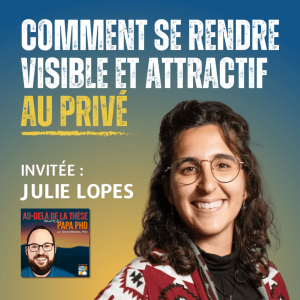
Thursday Jul 18, 2024
Thursday Jul 18, 2024
Dans ce nouvel épisode d'Au-delà de la thèse avec Papa PhD, découvre comment devenir visible et attractif dans le secteur privé. Avec mon invitée, Julie Lopes, explore des stratégies comme la visualisation, la présence sur LinkedIn, et le développement d'un mindset positif quand à la recherche d'emploi.Ne manque pas nos conseils pour mieux communiquer avec les entreprises et développer ton réseautage professionnel dès maintenant !
Julie Lopes est docteure en microbiologie reconvertie dans l'entrepreneuriat, puis dans le conseil auprès des étudiant·e·s, doctorant·e·s et docteur·e·s.Sa mission est de les accompagner dans leur développement de carrière après le doctorat.
Points à retenir :
Valoriser ses ressources intérieures et extérieures : Julie insiste sur l'importance de connaître et de mettre en avant ses propres compétences et expériences, mais aussi de bien comprendre les besoins de l'entreprise pour proposer une véritable valeur ajoutée.Cultiver un réseau professionnel solide sur LinkedIn : La visibilité sur LinkedIn est essentielle, surtout pour les chercheurs. Julie mentionne qu'il y a environ 6000 embauches par jour sur la plateforme ! Il n'est jamais trop tard pour peaufiner votre profil et élargir votre réseau.Prenez le temps de la réflexion et du feedback : La prise de recul, le contrôle du stress et la recherche de feedbacks constructifs sont essentiels pour ajuster son approche et mieux répondre aux attentes des entreprises.Quelles stratégies mettras-tu en place pour améliorer ta visibilité et ton attractivité sur le marché de l'emploi ? Partage tes expériences en commentaire !Tu aimes Papa PhD ? Laisse-moi un commentaire > ici < - une courte phrase suffit ! Et inclus ton identifiant Twitter – comme ça je pourrai te remercier personnellement !
Les ressources de cet épisode :
Merci Julie !
RD2 Conseil | LinkedInRD2 Conseil | Site webSi cet entretien avec Julie Lopes t'a plu, fais-lui en part en cliquant sur le lien ci-dessous et en lui laissant un message sur LinkedIn :Clique ici pour la remercier sur Linkedin !Clique ici pour partager avec David le principal message que tu retiens de cet épisode !Si tu trouves de la valeur dans le contenu que je t'apporte chaque semaine, clique sur l'un des boutons ci-dessous et renvoie-moi l'ascenceur :)
Don sur PayPal
Deviens supporter sur Patreon !
Ou paye-moi un café :)
Tu aimeras aussi ces épisodes :
Olivier Hernandez – Du génie à l'industrie à l'astrophysique : PapaPhD.com/Olivier-Hernandez-Pt1Carine Monat - Bâtir un trajet qui nous ressemble : PapaPhD.com/Carine-MonatRémi Quirion – Projeter les jeunes chercheur.e.s dans des carrières d'avenir : PapaPhD.com/203Jean-Sébastien Provost – Accéder au domaine de la science des données : PapaPhD.com/Jean-Sebastien-Provost

Thursday Jul 11, 2024
Thursday Jul 11, 2024
Welcome to another episode of Beyond the Thesis with Papa PhD! Today, we're diving into the fascinating interface between science and comedy. Our guest – Lexa Graham – is a Toronto comedian and writer with a master's degree in chemical engineering. During our conversation, Lexa shares her journey from the lab to the stage, revealing how she struggled with the practical aspects of chemistry but found joy in teaching it, eventually deciding to "master out" instead of pursuing a PhD.In it we explore how Lexa uses humor to make science more approachable, discussing her website DNAatured.com, her 1-on-1 workshops, and her monthly live comedy show, Dirty Science, with which she aims to increase engagement and make complex scientific topics more memorable through laughter.Join us as Lexa explains her transition from academia to comedy, the role of satire in her work, and her veiw on the importance of distinguishing humor from reality in today's age of misinformation. Whether you're a scientist, comedian, or just someone who loves a good laugh, this episode is packed with insights and chuckles. Don't miss it!
Lexa Graham is a Toronto comedian and writer with a Master’s degree in Chemical Engineering, and is the creator of DNAtured Journal, a satirical academic journal on academia and science.Lexa runs humour workshops for scientists and other professionals looking to increase their audience engagement, and is a popular host, performer, and panelist for science-based events, including Story Collider, The Association For Science Communicators, Spark After Dark, and The Canadian Association of Science Communicators.Lexa also runs a monthly science comedy show called Dirty Science.
What we covered in the interview:
Leveraging Humor to Enhance Engagement: Lexa shares how adding humor to science communication can make intricate topics more relatable and memorable for audiences. It fosters a deeper connection and makes learning enjoyable.Navigating Career Paths: We discuss Lexa’s inspirational journey from studying chemical engineering to making her mark in the comedy world, highlighting the importance of flexibility and finding fulfillment in one's career.Challenges of Science-based Satire: We talk about how the pandemic raised the bar in terms of choosing scientific topics and making sure science-based comedy is clearly humorous and not mistaken for real news.🔗See the resources section below for links!
This episode’s resources:
Website: LexaGraham.caFacebook: Facebook.com/DNAturedjournalX: @denaturedjournal
Thank you, Lexa Graham!
If you enjoyed this conversation with Lexa, let her know by clicking the link below and leaving her a message on Linkedin:Send Lexa Graham a thank you message on Linkedin!Click here to share your key take-away from this interview with David!
Leave a review on Podchaser !
Support the show !
You might also like the following episodes:
Vikie Pedneault – Engaging Through ComedyAndy Churchill –Presenting for ImpactAmani Said – How to Make impact with Your CareerStephani Mason – Promoting Diversity in FacultyAs always, if you find value in Papa PhD and in the content I bring you every week, click on one of the buttons below and send some of that value back to me by becoming a supporter on Patreon or by buying me a coffee :)
Support the show on Patreon !
Or buy me a coffee :)
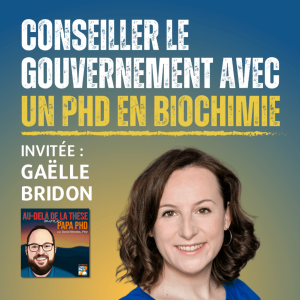
Thursday Jul 04, 2024
Thursday Jul 04, 2024
Dans ce nouvel épisode d'Au-delà de la thèse avec Papa PhD intitulé "Du labo au cubicule : Conseiller le gouvernement avec un PhD en biochimie", j'accueille Gaëlle Bridon, qui a transformé son expertise de recherche en biochimie en une carrière dynamique au sein du ministère de l'économie, de l'innovation et de l'énergie. Gaëlle revient sur son parcours allant de la recherche universitaire à la vente d'instruments scientifiques, et partage comment ces expériences l'ont préparée à analyser des projets d'investissement en biotechnologie dans le contexte ministériel. Elle partage aussi des conseils précieux pour les étudiants en fin de doctorat sur la réflexion de leurs aspirations professionnelles et l'importance du réseautage.Rejoignez-nous pour une discussion enrichissante sur les transitions professionnelles, le maintien de l'identité scientifique et les opportunités inattendues au-delà de la thèse. Bonne écoute!
Gaëlle Bridon a obtenu un doctorat en biochimie de l’Université de Montréal en 2012 en étudiant au sein de l’unité de recherche en protéomique et spectrométrie de masse bioanalytique sous la direction du Dr Pierre Thibault. Elle est ensuite devenue associée de recherche à l’université McGill pendant 5 ans en œuvrant à la plateforme de métabolomique à l’Institut du cancer Rosalind et Morris Goodman. Elle a par la suite rejoint la compagnie Agilent pendant 5 ans où elle a occupée le poste de spécialiste de produit en spectrométrie de masse pour l’est du Canada, puis le rôle de gestionnaire marketing pour le segment global de métabolisme cellulaire. Elle s’est ensuite rapprochée du secteur des sciences de la vie local au Québec en devenant gestionnaire des communications et analyste-conseil chez BIOQuébec avant de devenir conseillère sectorielle au sein de la direction des sciences de la vie et des technologies environnementales au ministère de l’Économie, de l’Innovation et de l’Énergie. Gaelle est une adepte de la course à pied et de djamboola, elle adore aussi faire la pâtisserie (les macarons français citron-basilic sont les meilleurs !) et jardiner.
Avec Gaëlle on a parlé, entre autres :
De l'importance de ne pas refuser une opportunité sous prétexte qu'elle semble éloignée de votre domaine d'expertise.De pourquoi il faut être présent et actif sur les plateformes comme LinkedIn pour bâtir un réseau solide.De combien la préparation est cruciale, que ce soit pour une présentation scientifique ou un pitch de vente.De l'importance de valoriser la pluralité des métiers dans la recherche pour enrichir notre communauté.Tu aimes Papa PhD ? Laisse-moi un commentaire > ici < - une courte phrase suffit ! Et inclus ton identifiant Twitter – comme ça je pourrai te remercier personnellement !
Merci Gaëlle !
Si cet entretien avec Gaëlle Bridon t'a plu, fais-lui en part en cliquant sur le lien ci-dessous et en lui laissant un message sur LinkedIn :Clique ici pour la remercier sur Linkedin !Clique ici pour partager avec David le principal message que tu retiens de cet épisode !Si tu trouves de la valeur dans le contenu que je t'apporte chaque semaine, clique sur l'un des boutons ci-dessous et renvoie-moi l'ascenceur :)
Don sur PayPal
Deviens supporter sur Patreon !
Ou paye-moi un café :)
Tu aimeras aussi ces épisodes :
Olivier Hernandez – Du génie à l'industrie à l'astrophysique : PapaPhD.com/Olivier-Hernandez-Pt1Carine Monat - Bâtir un trajet qui nous ressemble : PapaPhD.com/Carine-MonatRémi Quirion – Projeter les jeunes chercheur.e.s dans des carrières d'avenir : PapaPhD.com/203Jean-Sébastien Provost – Accéder au domaine de la science des données : PapaPhD.com/Jean-Sebastien-Provost
